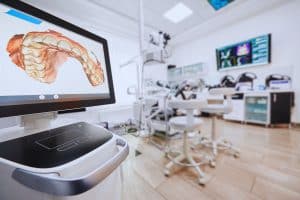From our latest blog posts, you learned that a thorough due diligence process is crucial in dental practice transactions to minimize risks and guarantee a prosperous result. It involves the analysis of different aspects of a dental practice before the purchase or sale occurs, covering financial, legal, and operational aspects.
As a dental CPA company, we know this procedure is filled with complexities and intricate details that require meticulous attention. For this reason, this blog post was written to cover a detailed due diligence guide designed specifically for dental practice acquisitions. We separated this list according to the different areas this process encompasses. By following this guide, you will be able to equip yourself with the necessary tools to make informed decisions, identify potential risks, and ensure a successful transition.
Financial Due Diligence:
Let’s start with the financial aspects of a dental practice. Financial due diligence involves reviewing a practice’s financial stability and growth potential by looking at financial statements, tax returns, revenue, and expense trends to understand the practice’s performance and risks. This analysis usually involves comparing financial ratios to industry benchmarks. Here’s a list of the main components you should pay attention to:
Income Statement (Profit and Loss Statement):
This statement provides a summary of the revenues, costs, and expenses over a specific period, indicating the profitability of the dental practice. The professional responsible for conducting the analysis will probably review the financial statements for the past three to five years. By assessing profitability trends and income sustainability, you can gain insight into the practice’s long-term financial health.
Besides, analyzing the breakdown of expenses, such as staff costs, supplies, rent, and overhead, allows investors to identify areas for potential cost savings. This is essential for making informed decisions about investment, growth, and operational improvements.
Accounts Receivable and Payable:
This report shows how much money patients and insurance companies owe you. It helps evaluate how well the practice is collecting its revenue; in other words, it’s crucial to understand the practice’s cash flow. Here the CPA will try to identify any pending liabilities and obligations to vendors or creditors, as these can significantly impact the financial viability of the acquisition. Moreover, by understanding the age of these receivables and the collectability rate, your CPA can determine the effectiveness of your practice’s billing and collection processes. A comprehensive review of these factors will assist in the strategies for managing and optimizing cash flow during the post-acquisition phase.
Taxation:
If you run a practice, you know that taxation can directly affect your financial health. For that reason, during due diligence, the CPA will conduct thorough reviews of your tax computations from the date of incorporation or over the last years to analyze your company’s current tax status. This process also includes reviewing any ongoing investigations conducted by the Internal Revenue Service (IRS), if applicable. Examining taxation details helps identify potential risks and liabilities associated with the practice. Any outstanding tax issues or audits can be addressed proactively, reducing the risk of future disputes with tax authorities.
Your dental CPA will also examine any tax planning strategies or elections that have been implemented by the practice. Identifying efficient actions can contribute to cost savings and improved financial performance.
Operational Due Diligence
This part of the process evaluates the overall structure and organization of the dental practice. This includes staff qualifications, infrastructure, systems, and supplier relationships. This thorough process can help identify any operational inefficiencies or areas in need of improvement. We’ll explain these topics below:
Infrastructure: Technology, Equipment, and Facilities
An in-depth examination of the existing dental technology is essential. The dental CPA will analyze the practice’s technology infrastructure, including management software and systems, and patient communication tools. Besides, he will assess the condition and maintenance of dental equipment to determine potential upgrades or replacements. The physical condition of the dental office is also a critical aspect that might be inspected to ensure compliance with safety and accessibility standards. Additionally, your consultant can determine the potential for facility expansion or renovation, aligning the practice’s physical infrastructure with future growth strategies.
Staff Qualification
This step involves assessing the credentials and experience of the dental professionals, as well as the support staff. Understanding the current staff’s qualifications helps in planning for a smoother transition after the acquisition. The acquiring dentist can assess whether the existing team is well-equipped to adapt to any changes in management or practice policies. Besides, the turnover rates can also affect the practice’s operational efficiency. High turnover rates may lead to frequent changes in personnel, potentially affecting the consistency of services provided. A stable and qualified staff ensures smoother day-to-day operations.
Supplier and Vendor Relationships
The practice’s relationships with suppliers and vendors directly impact its operational efficiency, affecting the supply chain management, quality assurance, and overall adaptability to changes in the dental industry. Efficient relationships ensure a consistent and timely supply of essential materials and equipment, avoiding disruptions in patient care and maintaining smooth daily operations.
Therefore, it’s advisable to review contracts with suppliers and services to evaluate the terms, conditions, and pricing structures. A transparent understanding of these relationships facilitates effective supply chain management post-acquisition.
Legal Due Diligence
Legal due diligence is essential to comply with healthcare laws and regulations. It involves a detailed review of contracts, licenses, permits, and other legal documents to ensure that the healthcare entity is operating within the bounds of the law. Additionally, it helps identify any potential legal risks or liabilities that may exist.
Ownership, Contracts and Licenses:
Establishing legal clarity around ownership is fundamental. The CPA must confirm the legal ownership of the practice and review contracts with landlords, insurers, and other key stakeholders. He must also identify any pending legal disputes or liabilities that may have repercussions for the acquisition. This will mitigate the risk of future legal disputes and increase the overall value of the acquisition. One overlooked detail here is the practice’s intellectual property rights, like trademarks, copyrights, and patents. The CPA must ensure they are registered and protected. Besides, the status of licenses and permits must be in place and up to date.
Regulatory Compliance
With the multitude of regulations in the healthcare sector, you need someone to check if your practice complies with local, state, and federal laws. Here your dental CPA will confirm adherence to privacy laws, such as HIPAA, and assess the effectiveness of your current compliance measures to mitigate legal risks. Other regulations should be verified such as Occupational Safety and Health Administration (OSHA), infection control guidelines, and state dental board regulations. If you’re from California, you can access this website to check all the regulations your practice should attend to.
Legal compliance in the realm of employee and human resources is also important. A review of employee handbooks and policies helps identify any areas of potential legal concern. Considering HR-related legal issues before an acquisition allows for proactive resolution and establishes a stable foundation for the future.
Insurance Coverage
Adequate insurance coverage is a non-negotiable component of operational and legal risk management. In this step, your dental CPA must ensure that your insurance coverage, including malpractice insurance, is complete and sufficient. It’s important to check the insurance history and associated costs to understand potential future financial implications. Robust insurance coverage protects against unexpected events and liabilities like malpractice claims, property damage, natural disasters, equipment failure, or data breaches.
Feel free to save and read this text at your own pace, as there is a lot of information to absorb. We hope this guide serves as a roadmap for dentists intending to initiate an acquisition process. By meticulously evaluating the financial, operational, and legal aspects of a practice, you can make prudent and informed decisions. As the dental industry continues to evolve, strategic due diligence becomes an indispensable tool for dentists seeking to expand their businesses. If you need help with that process, don’t hesitate to contact us here. Our team of experts specializes in providing thorough and detailed due diligence services tailored to your special needs.




